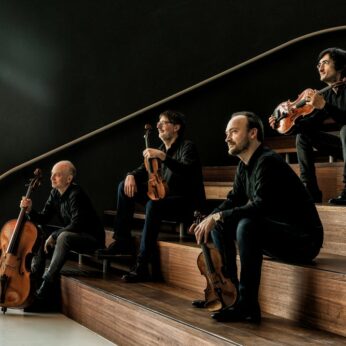Composer: Mieczyslaw Weinberg (b. 1919 - d. 1996)
Performance date: 01/07/2022
Venue: St. Brendan’s Church
Composition Year: 1970
Duration: 00:31:24
Recording Engineer: Simon Cullen, Ergodos
Artists:
Quatuor Danel (Marc Danel, Gilles Millet [violins], Vlad Bogdanas [viola], Yovan Markovitch [cello] -
[quartet]

Mieczysław Weinberg [1919-1996]
String Quartet No.12 Op.103 [1969-70]
1. Largo
2. Allegretto
3. Presto
4. Moderato
Any discussion of the leading post-war Soviet composers is brought up against the strict regime of Socialist Realism, meaning only broadly accessible, Party-minded and ideologically acceptable works would be supported. This was enforced by the Composer’s Union, to which every composer must belong bringing financial and other benefits, but also the need for every new composition to be approved both for publication and performance. The bizarre nature of this system meant works could be approved for publication but not for performance. Without this imprimatur a composer could not make a living. After Stalin’s death the heavy-handed approach was gradually relaxed, but there remained a suffocating atmosphere that actively discouraged new ideas meaning most serious composers wrote for the drawer to maintain their sanity.
After Kruschev’s 1956 so-called secret speech laid bare the sheer scale of Stalin’s purges, the subsequent thaw was more developed in Poland than in the USSR. The most obvious signal was the appearance of the first Warsaw Autumn in 1956, quickly becoming an annual festival that was able to invite musicians and composers from Western Europe and providing a stage for the Soviet avant-garde, who got no support at home. As a result in 1966 Weinberg was able to return to Warsaw, where he had spent the first twenty years of his life. It was not a successful visit for him. The Warsaw he remembered was no longer there, like Mariopol in our time it had been obliterated in the War. Also, as he was part of the official Soviet delegation the young avant-garde composers had no interest in him. He did however establish a long-lasting friendship with the young Polish composer Krzysztof Meyer. It was on this visit that Weinberg finally discovered for certain the fate of his sister and parents, who had perished in the Trawniki labour camp.
His second daughter Anna recalled that Father’s trip to Poland was very sad for him. He met almost nobody of the friends of his youth but he visited some people. He was sad because Warsaw was absolutely reconstructed and many friends were gone. It was after this trip he composed The Passenger, his first opera, dedicated to the Victims of Auschwitz. He insisted that The Passenger was his finest work, then adding All my other works are The Passenger also.
His Twelfth Quartet gives some idea of what he was going through at this time. The opening movement starts gently with a whispered tone row (his avant-garde pretensions) that is brutally interrupted by aggressively repeated cries of anger. This soon gives away to the return of the quiet opening; towards the end the middle section cries return, sotto voce. The delightful Allegretto plays with little rhythmic scraps. It feels like a game is being played with the musicians, trying out fragments to see if they can be brought together. The Presto breaks in unannounced. This is familiar territory by now, the pace is hectic, driven forward by insistent rhythms that bounce off each other. As always there is a wide range of pizzicatos from unrestrained savagery to the moderately civilised. The coda is visceral with an eerie close leading straight into another spectacular Finale.
As we advance through Weinberg’s extraordinary series of Quartets, we learn not to expect a clear resolution of the questions raised in the earlier movements. Initially it seems as though the opening chorale-like theme combined with the ever-present rhythmic cell will bring solace, but the consolatory theme gradually fades to be replaced by a more amorphous idea. The various rhythmic ideas then come together to generate a powerful climax that just suddenly collapses and we are left with scraps of the rhythmic cell against a background that seems to have lost all energy. It almost feels as if we are being shown how enervating it is live in such a stultifying regime. As we approach the end various short-lived attempts are made to break the spell. To conclude he calls up a pizzicato march that after a few bars just stops.
Francis Humphrys
Copyright © 2025 West Cork Music. All rights reserved.
Designed and developed by Matrix Internet